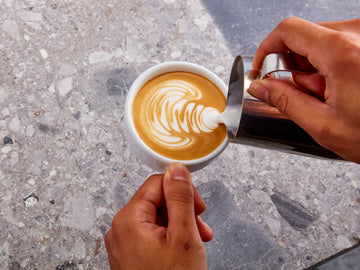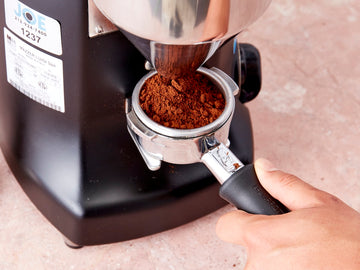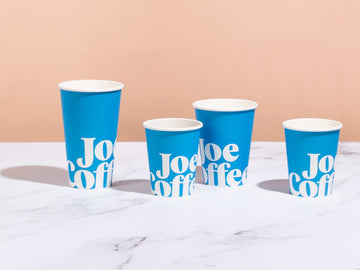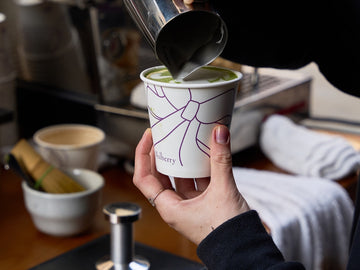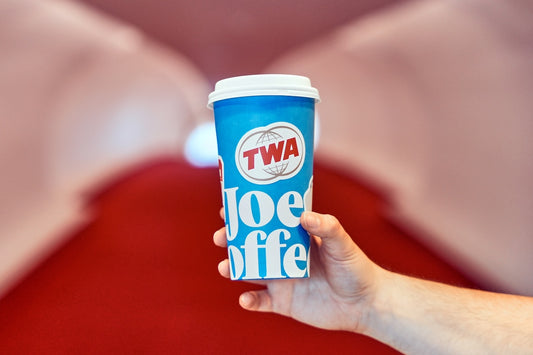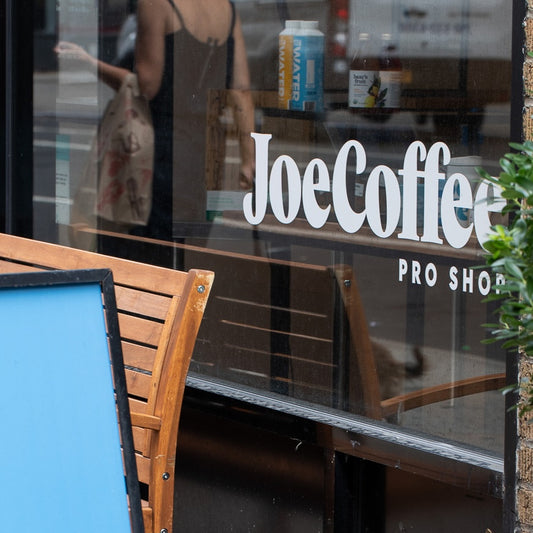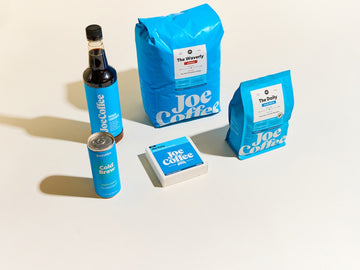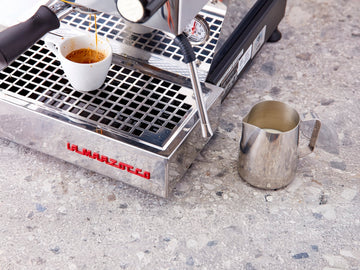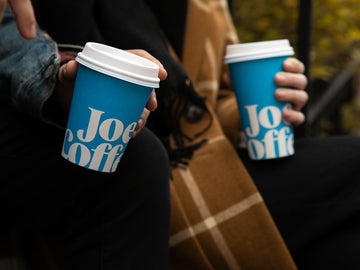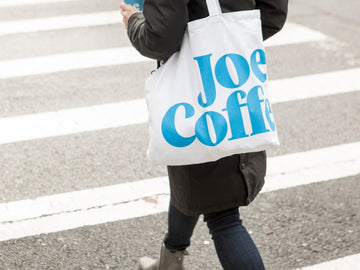imported
Categories
All articles
Introducing the Bench Talks Series
This July marks an exciting moment in our history–it’s our 20th anniversary! As we get ready to celebrate, we’re taking a moment to reflect on the community that has gotten us this far. From the folks who helped establish our first cafe on Waverly Place as a pioneering specialty coffee shop in New York to the community of regulars who have supported us through two decades of business in this city, it’s pretty clear to us that we’re surrounded by some pretty special people.
Enter “Bench Talks,” a new series dedicated to highlighting the diverse, talented, and incredibly kind humans who make our community so unique. Inspired by the benches outside of our cafes which have become symbols of conversation and welcome reminders to slow down to enjoy a cup of Joe, Bench Talks are informal chats sharing the stories and memories of the people who have helped make Joe what it is today.
Find them all here as they’re released and on Instagram @joecoffeecompany!
Episode 1: Jonathan and Gabby Rubinstein
Co-Founders of Joe Coffee Company
“We were known as the first third-wave specialty coffee company in New York City. And at that time no one would ever dream that there would be fifteen-hundred other great coffee bars in New York City twenty-years later. And to think that we have something to do with paving the way.”
Watch on Instagram
Episode 2: Alice and Richard Rubinstein
Co-Founders
Jonathan & Gabby's Parents
“The first day, the day that we opened, Alice was one of two or three baristas actually making the coffee and as I recall your sister was here and was cleaning tables at the time. So, it was an exciting time.”
Watch on Instagram
Episode 3: Eleane Miersch
Dry Mill Manager & Head of Quality Control at Fincas Mierisch
A few weeks after we filmed this Bench Talk, Eleane passed away unexpectedly. In sharing this with you, we honor her memory and her significant contributions to this industry.
“I have been involved with the business for more than sixteen years, and can say that I absolutely love everything I do.”
We are grateful for Eleane's passion, strong leadership, and easy friendship, all of which contributed to the Joe we know today, and a generation of coffee people who learned from her.
Watch on Instagram
Episode 4: Amanda Byron
Joe Employee #1 & Director of Coffee
“I remember us saying that we were going to be open only during the hours that I could be there because I was the only person who could do latte art. Back then, were were one of the few cafes that was really doing what I would consider specialty coffee at the time. People had never seen latte art before, so they thought that was really amazing. I got a lot of ‘did you do that on purpose?’”
Watch on Instagram
Episode 5: Ed Kaufmann
First Roaster & Green Buyer
“Jonathan and I became friends just through the small coffee industry back in 2006, ’07 and ’08. And we were just having some wine one night and I had been working on a business plan to open my own coffee company, and I just by the third bottle of wine I hired myself to be the roaster for Joe!”
Watch on Instagram
Episode 6: Samantha Dion Baker
Author, Illustrator, and Hicks Street Regular
“Our neighborhood needed a coffee shop like this so badly, and then suddenly Joe was opening and I got so excited I came over and drew the exterior, because I do that when something exciting is happening in my world I draw it. I love drawing storefronts, so I drew it. I tagged Joe, somebody saw it, Jonathan saw it, and then they ended up selling it as a card for a while.”
Watch on Instagram
Episode 7: Danny Meyer
Founder of USHS, proud investor of Joe Coffee Company
“I do not think I had my first experience of walking into a Joe Coffee until many many years probably after I had been a steady customer at Grand Central. This all started because back in the days when you would see a tall cup of Starbucks on every other desk in the office. There was one person on our team who would bring in this blue cup, and I would have no idea what it was. And I said, ‘what is that?’ and he said, ‘here, try it’ and it was amazing coffee.”
Watch on Instagram
Episode 8: Andrea Rubi
Second generation coffee grower, longtime Joe Coffee partner
“In 2012, my parents took at trip to New York City with my little sister Angie, because she was fifteen at that time, and she asked for a trip to New York. It was the first time that my dad and my sister had come to the city, and my dad was amazed because of the energy that this city provides. They went back home and my dad was like, ‘I sat with your mom at Bryant Park, and I was hoping that one day we can come back to New York, and we can actually say that we are going to have a cup of coffee of Ruland, served at a shop in New York’. And that’s how in 2015, we bought a second land and started growing specialty coffee.”
Watch on Instagram
Episode 9: Akeem Showers
General Manager of 13th Street and Union Square West
“Being apart of the community is big to me, it’s like being a part of a family. I remember just stating off at Joe and meeting Jonathan and Gabby Rubinstein, and having a conversation with them. That is always something that struck me and I will always carry with me, in a lot of companies you rarely meet the owners…That’s something that I always tell everybody; just be generous, be kind, be patient. Anything you want to learn you always can learn, just put your best foot forward.”
Watch on Instagram
Episode 10: Randy Garuitti
CEO of Shake Shack, friend of Joe
"My wife had just gotten here, and was in a bar with her mother of all people on Hudson Street, not too far from here, and the nicest person started talking to her as a new New Yorker. Turns out his name was Jonathan. They hit it off, and he said, ‘I am opening this coffee shop, and you should come by’. My wife and I ended up living over on Bank Street for four years, and we would come here all of the time, back in the beginning days.”
Watch on Instagram
Episode 11: Jacob Soboroff
NBC News Correspondent and Joe Coffee Regular
“I have been sitting on this bench since this coffee shop opened. One the corner of Gay and Waverly. It was, I don’t know, 2003, and I was living right over there on Mercer Street. This is the place where I had my first cups of coffee in my entire life.”
Watch on Instagram
Episode 12: Carrie Webster
Joe Coffee Roastery General Manager of Production
“I have been working here since 2011. I started out as a barista, and then I became an assistant manager, and then I became manager of Columbia, and 13th, and then Lexington. Then I moved over to the Roastery a couple years ago. I just wanted to try something new, expand my horizons and knowledge of the coffee industry. I missed my regulars a lot , but I like this new adventure of organizing, and it is a different kind of helping my team. I like that, the behind the scenes thing.”
Watch on Instagram
Episode 13: Chef Danielle Sepsy
Chef and owner of the Hungry Gnome
“Jonathan, the founder of Joe Coffee, he has a very special place in my heart, and in fact when I talk about him I get a little emotional. And I don’t even think he realizes this, but it’s because he has changed my life in so many ways. In 2020, at the start of the pandemic, I emailed Jonathan. He didn’t realize, but I had just lost my job at the company I was working for, and I was not on my own yet with the Hungry Gnome full time...I told him about my baked goods and asked him if I could bring some samples... Few days later I am in the office, I bring him samples, and that night he emailed me, and it’s an email that I have saved because it’s so special to me. He said that in the sixteen-ish years he had been in business, that he had never had better baked goods than I had brought him. In that moment my life changed because I signed on my first big wholesale customer, which was Joe Coffee.”
Watch on Instagram
Episode 14: Zachary Carlson and Jordan Michelman
Co-founders of Sprudge, co-authors of But First, Coffee
“Sprudge is an international publication dedicated to coffee culture all over the world, we are based in Portland, Oregon, with contributors all across the world and readers all over the world. We founded in 2009, and we publish coffee news, cultural reporting, city guides, hot new gear, all of the rest of it, every single day. You can find us at sprudge.com. Sprudge was originally a word we made up to define the leftover espresso grounds and espresso sludge that you get on your apron and shoes when you are behind a bar at a cafe.”
Watch on Instagram
Episode 15: Juanita O. Lewis
Executive Director of Community Voices Heard
“Community Voices Heard is a twenty-nine year-old, power building, community organizing group in New York State. We were founded back in 1994 by women who were on public assistance, and did not like how welfare was changing without their ideas and without what needed to happen to make it better. So they were fighting back against really bad policies that were impacting them and their families. So we grew from being just one issue organization and one location to now being in four places across New York State, and focusing on housing injustice, economic justice, and participatory democracy.”
Watch Part 1 on Instagram
Watch Part 2 on Instagram
Watch Part 3 on Instagram
Meet Erica Zeledón, the Artist Behind The Village
We're thrilled to unveil our new women-produced coffee, The Village, whose label art is just as stunning as the coffee within. As a product that features seasonally rotating coffees from valued relationships with female producers, we hoped to reflect the diversity of stories and perspectives as well as origins in the artwork. We had the privilege of working with the incredible Costa Rica-based illustrator Erica Zeledón Salazar to bring the concept to life.
Based in San José, Costa Rica, Erica studied Art & Visual Communication at the Universidad Nacional de Costa Rica and majored in graphic design. After spending several years working in the advertising industry, she took a leap of faith to forge her own path working full time in illustration. Her work is defined by vibrant colors and texture, along with the use of symbolic elements, connecting her ideas with the natural world around her.
To create the illustration for The Village label, we shared stories with Erica about the women producers we have come to know and whose work we aim to highlight, as well as the larger context of women's significant contributions to the coffee industry. Drawing inspiration from some of the imagery we shared, including the women of the Turihamwe Cooperative in Burundi dancing, Erica anchored the illustration with a woman with welcoming, open hands symbolizing creation and harvest, and intertwined elements of growth and cycles, which are integral to the production of coffee.
We had a chance to speak to Erica about what inspires her work, and specifically the design for The Village. Her answers are presented in Spanish with their English translations.
You mention that nature and the cycle of life are the main themes of your illustration work. What is it about these subjects that inspires you?
Nature has the ability to be a source of constant creation and transmutation—in it, we can find such microscopic elements that are difficult to see with the naked eye, as well as large bodies that make you feel so small—each and every one of them essential and important in the cycles of life. At the end of the day, everything is connected and those connections are what catch my attention completely.
What type of color palette do you gravitate towards and why?Me suelen gustar los colores primarios y el verde, para mí son el inicio de todo y siento que son “accesibles” a un público más amplio, con esto quiero decir que busco crear ilustraciones que sean de una lectura más “fácil” ya que el detalle de las mismas puede estar cargado de elementos y al usar estos colores busco que no sean “pretenciosas” por ponerlo de alguna manera.
I usually like primary colors and green. For me they’re the beginning of everything and I feel they’re “accessible” to a wider audience. By this, I mean to say that I seek to create illustrations that are “easy” to read so the details can be loaded with elements, and by using those colors, I look for them to not be “pretentious,” to phrase it like that.
How long have you been illustrating, and how have you evolved as an artist over the
I started in the world of illustration 10 years ago and it has been a whole process to be able to understand myself, to know myself to be able to understand what I wanted to achieve as an artist. Besides, we’re in an era of bombardment of styles and trends you’re supposed to follow in order to be seen and taken seriously. That’s why practice and sketching are so important as a source of idea generation beyond looking at external references that can be confusing to us. Looking inward is key to being able to grow, because at the end of the day we are our own most honest source of what we really want to achieve.
When working on the label for The Village, what was your process to create the illustration? (How did you interpret the brief/draw inspiration from the photography we provided, etc)
I think it was key to create an illustration that celebrated the playful part of the coffee harvesting process that could represent a community of women. Likewise, it was important to use essential natural elements in the process of growth of the coffee plant, such as the birds who are agents of pollination, in addition to what is necessary: the sun as both a source of vitality and a symbol of the cycles of life.
Introducing POLLAST!C™ Mailers
Here at Joe, sustainability is always at the forefront of our minds—from our commitment to sourcing Rainforest Alliance Certified coffee and working with partners who prioritize lowering their carbon footprints to composting our coffee grounds in our cafes. So naturally, when we discovered Better Packaging Co's POLLAST!CTM mailers, we were eager to seize the opportunity to make a bigger impact with our packaging choices.
We're excited to announce that our mail orders will now be packaged in POLLAST!CTM mailers, made 100% from ocean-bound plastic collected from coastal communities in Southeast Asia. In these under-resourced regions where very little waste management infrastructure exists, plastic pollution accumulates on beaches and waterways, becoming the source of much of the world's ocean plastic pollution. Better Packaging Co works with these communities to collect plastic from the shorelines, paying a fair wage, which in turn helps lift them out of poverty.
In making this shift, we grappled with the question of the sustainability of a recycled plastic product over a paper or compostable product, and you might be wondering the same thing! Ultimately, we believe we can make a more significant impact with this choice. Here's why: POLLAST!CTM mailers use 75% less CO₂ than a virgin plastic product and 88% less than a virgin compostable bag. They also have a lower carbon footprint than any paper package or recycled product on the market.
What's more, we are actively supporting shoreline cleanups that prevent plastic from entering the ocean and simultaneously helping communities fight poverty. An estimated 5-13 million tons of plastic enters the ocean every year and that figure is expected to triple by 2040. Over 70% of that plastic enters oceans via land and over 80% of that comes from Asia. That's why Better Packaging Co focuses their collection efforts in Southeast Asian coastal communities. In the course of a year, we'll be able to divert the equivalent of 54,200 single-use plastic bags from the ocean! Whether you recycle your package with soft plastics, or dispose of it responsibly at home, the plastic ends up in a better place.
As a company dedicated to transparent supply streams, we also appreciate Better Packaging Co's commitment to traceable sourcing—every mailer comes with a tracing code which you can use to find out where the plastic used to make your mailer was collected! Plug in the code at the bottom of this page to trace your mailer's origin. Even better, as a B Corp Certified business and Certified Carbon Free business, Better Packaging Co works to offset 100% of their carbon emissions. We're excited about this new partnership, and look forward to hearing what you think!
Better Packaging Co's production partner collecting plastic pollution in Malaysia
Meet the Team: Sean Ben-Zvi
If you’ve taken a class through The Workshop or popped by our Pro Shop in Chelsea anytime recently, chances are you’ve seen Sean Ben-Zvi slinging latte swans or coaching a group of students on how to cast the perfect pour. Since she started back in April, Sean has guided countless home brewers, budding baristas, and wholesale clients through the ins and outs of the art and science of coffee as our training manager for wholesale and public education. Sean has big things brewing for our public education program, and sat down with us ahead of launching a slate of new classes through The Workshop to chat what’s to come.
Sean Ben-Zvi, perfecting her signature latte art swan.
Hi Sean! We're so happy to have you here. You joined the Joe team a few months back—can you tell us about how long you've been here and what drew you to work at Joe?
I've been at Joe since the beginning of April and I've had an absolute blast so far! Joe Coffee is such a deep-rooted structure in New York City and I wanted to be a part of its legacy. Since joining I'm elated to have learned more on how much importance this company puts on producer relationships and supporting farmers.
Here at Joe, you're the training manager for wholesale and public education. What do you enjoy most about your role, and working at Joe specifically?
What I enjoy most about being in education is the impact it can have on the individual as well as the culture as a whole. I feel because of the quality and popularity of Joe cafes, the company catches consumers' attention to indulge in more coffee knowledge; essentially working at Joe allows me to have a much wider reach of impact within the coffee drinking community.
The Workshop is Joe's public education program—where we dive into everything from home brewing to roasting, coffee cupping and of course, latte art! What do you think makes The Workshop unique, or different from other public education offerings out there?
I feel The Workshop fills a nice little hole between absolute beginner Googling coffee facts, and the SCA [Specialty Coffee Association] courses offered in the city. The Workshop is approachable, affordable, and very fun. It is the testing site of exploring whether you want to dive deeper into the science of coffee, or you simply want some tools to make better coffee at home—all while giving you a strong foundation to keep building upon (whether that is with more advanced courses or daily home practice).
Those who haven't had the chance to meet you yet might not know that you're also a latte art competitor. How does your background—latte art champ and beyond—influence your work at Joe?
I have a background in performing arts which is instrumental in my success in education. I have also worked in many different cafe environments, giving me a deeper perspective of cafe operations which helps me answer ultra-specific questions. I've competed and won in latte art competitions, including a big national competition, so it's always fun to pull out a swan at the end of class. And of course, I wouldn't be anywhere without my "fake it 'til you make it" mantra :)
Your role also involves training our wholesale clients! What do you find interesting or exciting about this aspect?
I absolutely adore working with wholesale clients. As I mentioned before, my biggest goal with education is impact. Supporting our wholesale clients is a crucial way to be able to impact the level of coffee served in the city, as well as to be able to give people skills that they can develop and make a career out of. As a young barista I always had to fight for every scrap of information since education is not usually prioritized in cafe environments. I'm grateful I get to give young baristas what I always wanted when I was in their shoes.
You have a lot planned for the future of The Workshop! Without giving too much away, what are you excited most for around what's to come?
Picking what I'm most excited for feels like picking a favorite child—impossible! What I can say is we're working toward offering more focused and specific classes in addition to our current core classes. A way to continue developing with us for as long as someone would like, knowing that the coffee industry is forever growing and there's always more to learn!
We're adding new class offerings to The Workshop! Check for more Fall dates soon.
Looking Ahead to the New Year
It's been 18.5 years since our founders, brother-and-sister-duo Jonathan Rubinstein and Gabby Rubinstein, first opened the doors on our inaugural Joe Coffee at Waverly Place.
Jonathan and Gabby in the "early days" of Joe Coffee.
Nearly two decades, two dozen or so cafes, and a whole lot of milestones later, the pair sat down with our Director of Coffee & Roasting, Amaris Gutierrez-Ray, to reflect back on just how far we've come, and to take a look at the year (and next two decades!) ahead.
Interview with the Founders: Jonathan Rubinstein and Gabby Rubinstein from Joe Coffee Company on Vimeo.
In Conversation with Go Fund Bean
While our annual holiday coffee, Rockefeller, is always rooted in what this season means to us, this year in particular we wanted to focus—both in cup as well as spirit—on compassion, intention, and giving. To make this coffee a standout, we teamed up with Go Fund Bean to double down on supporting our greater network of essential hourly coffee workers. Go Fund Bean is a nonprofit organization dedicated to supporting, uplifting, and defending baristas nationwide. Established in the early days of the COVID-19 to support folks put out of work by the pandemic, the organization has grown to so much more over the last year—mentorship, free mental health care, disaster relief grants, and more. For each bag of Rockefeller sold, we'll donate $1 to Go Fund Bean.
Ahead of the holidays, we sat down with the team at Go Fund Bean to learn more about the critical work they do for the industry, how they remain motivated to keep pushing forward, and what they see for the future of the organization and baristas everywhere.
Pictured above: Adam JacksonBey, Founder of Go Fund Bean.
Q: Who and what is Go Fund Bean and what does it do?
A: Go Fund Bean is an organization that supports, uplifts, and defends the hourly coffee worker. We do that through a variety of ways including through direct aid, like our Grants program and Disaster Relief program; through supporting hourly coffee worker's mental health with our Stay Grounded Initiative, our talk therapy program, and Get Psyched, a collaboration with Umeshiso to help provide and through professional development; and with our Bean Development classes and Bean for Bean, our mentorship program.
Q: What prompted the formation of Go Fund Bean? How has the organization evolved since its formation?
A: We started on March 17th, 2020, right at the beginning of the pandemic, when out of work baristas were sharing [virtual] tip jars to help them make ends meet in the face of massive layoffs. We were promoting their tip jars, trying to get attention to them beyond their communities. About a month into that, we were contacted by a couple of companies that wanted to donate to Go Fund Bean and have us disburse the money to the baristas ourselves. We incorporated as a nonprofit so that we could be best positioned to do this.
How we've evolved over the past year and a half has a simple answer: we've grown. We've stayed true to our guiding principles—supporting, uplifting, and defending hourly coffee workers. We've taken a hard look at what that really means and used that answer to grow what we can do as an organization, starting with giving out grants to hourly coffee workers impacted by COVID and adding more programs as we went along. We have a very holistic view of what it means to support, uplift, and defend.
Q: What would you say have been the biggest challenges across the lifetime of the organization? It strikes us that you've had to put active collaboration into practice, which is a little bit of a difficult thing to do sometimes. How have you collectively navigated through ups and downs?
A: The biggest challenge we've had is that we've grown extremely quickly and it has been hard to try to scale that growth while maintaining the same level of care, but manageable. We're lucky to have a responsive, attentive, and active Board of Directors that is able to guide the future of the organization. They continue to provide support to help us set up structures, which allows us to grow quickly and efficiently.
Active collaboration is a hard thing to do sometimes, but one thing that is special about this generation of coffee professionals and organizations is that we want to work together. Competition isn’t part of it. We've been lucky to support and be supported by other organizations within the industry: CCRE, Getchusomegear, and Glitter Cat, to name a few, that have helped us grow and allowed us to bounce ideas off each other and work together in both formal and informal ways.
Q: What are some of the challenges and successes you see within the coffee industry today as a whole? (This may also get at the underlying question...how are you defining "the coffee industry" for your organization's purposes?)
A: The biggest challenge we see in the industry is the same it’s always been: a lack of support for workers at both ends of the supply chain. Both the producers and the hourly coffee workers are integral to coffee worldwide, and our industry could not exist without them, yet they’re the lowest paid members of our value chain. We feel as though they should be supported in every way possible, and the best way to do that is through collaboration and collective action on both ends of the supply chain.
Q: Is there anything related to Go Fund Bean that speaks most to your heart, that you're most passionate about, or see yourselves as being most uniquely capable to accomplish?
A: We love our mission because it’s simple but powerful: support, uplift, defend. One thing that we are going to spend the next year or so working on doing better is defending the hourly coffee worker. Hourly coffee professionals face many challenges, and figuring out how to be reactive and supportive, through work such as our grant program, has been easy. Now we are focused on being more proactive to give hourly coffee workers structure and a framework to be better in this industry. We’re doing this through our Bean Development classes, Bean for Bean mentoring, and the mental healthcare Stay Grounded Initiative. We also have an upcoming Advisory Committee that will be made up of current hourly coffee workers.
Q: What's the future for the organization?
A: Ideally, our goal is to no longer be needed! The programs that we have been doing, are doing, and will be doing in the future should already be in place for hourly coffee workers, whether that's through the government or their employers. Until that day comes however, Go Fund Bean will be focused on collaboration and growth. We want to collaborate with more organizations and companies in order to help more hourly coffee workers reach their full potential within this industry and as individuals.
If you are or someone you know is an hourly coffee worker in need of emergency financial assistance, training, or mentorship, or if you would like to make a contribution to support the work of Go Fund Bean, please visit their website here.
Q&A with Juanita Lewis, Community Voices Heard
Community Voices Heard (CVH) was founded in 1994 and is the largest Black-led, member-driven, grassroots, principally women of color and low-income families organization in New York State. Back around this time last year, we first began working with CVH with the release of our Rockefeller holiday coffee, where $1 of each bag sold went to support their work building power to secure racial, social, and economic justice for all New Yorkers. This year, we're thrilled to share we'll be partnering up again on an upcoming coffee—more on that soon!—but in the meantime, we wanted to take this Giving Tuesday as an opportunity to sit down with CVH executive director Juanita O. Lewis for a look at the group's history, current projects like Follow Black Women, and their vision for an equitable future.
Looking for more ways to support Community Voices Heard? Please consider making a donation here.
Q: Can you walk us through the formation of Community Voices Heard? Where did it begin and how has it evolved since its formation?
A: Community Voices Heard (CVH) was founded in 1994 in response to the Clinton-era changes to welfare. Many of these families were forced to participate in the Welfare to Work program in order to receive public assistance. There were very few grouops organizing those on public assistance to make policy changes to address systemic issues. From the early leaders who were fed up with the exploitative work requirements imposed on welfare recipients by federal and local government to those who have, and currently drive, a broader agenda to secure a just social safety net, family-sustaining jobs, and access to them as well as truly affordable housing, and thriving communities—throughout the organization’s evolution, encouraging participatory democracy of the most marginalized has remained critical to CVH’S mission. CVH has not only expanded its issue focus but its reach with chapters in New York City, Westchester County, Orange County, and Dutchess County.
Q: Where does CVH Power come in? So often we speak about the challenges but you all are an action-based group, can you share your successes with us?
A: In 2012, members and allies of CVH decided that a seat at the table was not sufficient if its occupant did not wield enough power to enact the radical policy change necessary to center communities of color state-wide. Thus, CVH Power! was established as a political entity that would intentionally change the structure of New York’s political landscape. At CVH Power, we seek out, politically educate, train, and endorse candidates of color; we also support persons that ideologically align, support, and further our mission to advance low-income communities of color across New York State. In 2021, we ran our largest political program, where we endorsed 20 people total in NYC and Yonkers. We reached over 100,000 voters between face to face conversations, phone banking, and texting. 17 of the 20 candidates won their races. We are excited to build a co-governing agenda focused on racial, social, and economic justice with this cohort of officials.
Q: We're living in a time that's both quite complex and unique... but also reminiscent of a historical holding pattern when it comes to social justice. What are your thoughts on where we are right now and how we can break out of the pitfalls of the past?
A: The impacts of Trump, the COVID-19 pandemic, and Black Lives Matter uprisings have renewed an interest in organizing and lifting up the voices and experiences of those who are impacted by these issues. There is also more interest in scrutinizing structures to explore what reforms are needed to yield more equitable outcomes. It is more evident than ever that we need to continue building grassroots leadership that creates and leads a progressive agenda.
Q: Is there anything related to Community Voices Heard that you're most passionate about, see yourself as being the most uniquely capable to accomplish, or that you're most looking forward to working on in the near future? What initially drew you into the work at CVH?
A: I came to CVH almost 13 years ago because of the member-led vision and mission. Members take on roles identifying campaigns, building strategy, and taking action. It is wonderful to see the transformation of members as they take on these roles. I am looking forward to holding our statewide member campaign sessions in person, continuing to build our Follow Black Women project, and leading trainings through our Ella Baker School for Organizing.
Q: Lastly, since we are a coffee company, and we are attempting to connect our immediate communities with our larger, global coffee community -- do you have anything to share about the power of women everywhere?
A: In 1977, Barbara Smith and the Black feminist visionaries of the Combahee River Collective observed, “Until Black women are free, none of us are free.” The Black women of the Combahee River Collective remind us: it is racial justice that will bring us all democracy. American democracy, as it turns out, is on the side of freedom and racial justice only because Black people—and Black women, in particular—have organized to make it so, locally and nationally.
Q&A with Jim Ngokwey, Mighty Peace Coffee
Jim Ngokwey is a Managing Partner at Mighty Peace Coffee, an importing company working exclusively with coffees and communities in the Democratic Republic of the Congo. We met Jim, who is Congolese himself, in early 2019; but of course, COVID was soon on our doorstep. Nevertheless, knowing Jim has taught us a lot about the impact of, and, more importantly, the potential for, the coffee industry in the Congo. Through collaboration with Mighty Peace, we have developed a deeper understanding of coffee’s history as a Black history, in order to find our agency and place within it. Jim speaks very passionately about the core mission of Mighty Peace—to “support communities transitioning from war to peace in parts of DRC that have been victimized by the conflict.” He sees the potential for using the coffee industry intentionally to face the challenges that Congo inherited, and has chosen to take action through his work. We sat down with Jim ahead of the launch of our new Atlas Collection release, Congo Mapendo, to talk all things coffee, gender equity, and the impact of COVID-19 on coffee producing communities in Congo. Q: We were so pleased to taste a women-grown coffee when you first offered us the chance to try it. Could you share about the decisions and goals to separate out this coffee grown by female producers in Congo? Was it a choice the growers made themselves? There is so much to learn about gender equity expressed in different places, and it seems to us that there is already a lot of value placed on women in Congo, so we're trying to better understand that and learn from their strong example.A: Before diving into the answers, I'd like to share that gender equity is important to Mighty Peace Coffee; we're very proud to be led by women executives, Liza and Linda. We are working on initiatives to up-skill women in Congo to have more women understand the quality and business side of the industry and attain higher paid positions. We're intentional about this as a lot of research out there shows that women spend most of their income on their families, a lot more than men, and that when you work on social impact, economic empowerment and poverty eradication, we believe women must have multiple seats at the table.The decision to separate out Mapendo (men and women) and one exclusive from women producers, Mapendo Women, was spurred by an NGO operating in the DRC called Elan RDC. Elan RDC was financed by UKAID and its mission was to increase the income of at least 100,000 people across various industries in the DRC. Gender equality and social inclusion is one of its key pillars and that’s how the idea to separate into a women-only lot came about. The goal was to proactively identify women producers in the cooperative and seek their coffees specifically, help them improve quality, and increase their income. Additionally, Linda has an extensive network in DRC and she always had great relationships with these producers, had tried their coffee in the past and early in 2020, and we started discussing how Mighty Peace Coffee could work with them. It started with free workshops that Linda would conduct with the cooperative, and as they started implementing her feedback, we started discussing working together on lots that we would purchase in 2021. The impact and feedback have been overwhelmingly positive and Mapendo Women will be on our offering list every year moving forward. Q: When it comes to gender equity in Congo, or this group of women specifically—what's their vision for their future?A: They are working on various projects, many of which are around creating additional streams of revenue. Livestock and goat breeding in particular is a key project the women have worked on. Through this initiative they were able to raise and sell more than 1,000 goats, which is an important additional source of revenue for them and their families. A key priority for next year will be to evolve the goat project, to include chickens and pigs as well for further diversification and additional income streams. Other short- and long-term projects include the construction of a clinic for women, to provide quality healthcare services in closer proximity to where producers live, to reduce and sometimes eliminate travel time to access healthcare. Another major initiative for the rest of the year and 2022 is to increase investments in AVEC (Association Villageoise d’épargne et de Crédit), which translates to Village Association for Savings & Loans. It operates like a credit union and provides loans to the community. Q: The name Mapendo—love—is so powerful. Reading about the history of the women, some of them widows, was really meaningful to us. Was the name given to the coffee product first, or the community group first?A: The name Mapendo came from conversations with our team on the ground and the producers; we wanted a name to identify the lots that are being produced for Mighty Peace Coffee and would represent the meaning and message they want to put out to the world through their partnership with us. That has been our approach with all offerings; brainstorm the message and meaning they want their coffee to have in the world, and name their offerings that way. This collaborative approach to naming the coffee, instead of naming it after the washing station or territory, fosters further ownership and engagement in this partnership, and allows the community to play a role in the story and meaning their coffee conveys to the world. Q: We often talk about our shared challenges in this pandemic age. Could you share about the successes of the community of coffee growers that the Mapendo women are a part of? What do they feel proud of that they have accomplished over the past couple of growing seasons with the pandemic limitations?A: Progress on the construction of the clinic and additional funds for the AVEC credit union were some of the brightest spots. But overall, the pandemic has been extremely challenging. Many producers abandoned their fields especially as buyers cancelled orders early on; times were particularly hard during lockdowns. As there wasn’t much traffic and much movement, their side businesses came to a screeching halt and many who expected to earn additional revenue through goats were hurt as their finances tightened. They weren’t able to provide veterinary care to their animals and quite a few ended up losing their goats. Despite these extreme difficulties, there were examples of success in the pandemic; a producer named Charlotte Fikiri is one such example: she was able to take care of her goats and sell a few during the pandemic, and she used this additional income to purchase more land on which she’d produce and sell more coffee. There unfortunately weren’t many women as successful as Mrs. Fikiri, but as vaccines are starting to become available in Congo, we expect to have many more such stories next year.
Mighty Peace: Stories from the Farmers of Congo Umoja
This spring, we released our first single origin from the Democratic Republic of the Congo—a delicious washed Bourbon called Congo Umoja grown by a cooperative of smallholder farmers in Eastern Congo. In exploring this new origin for our menu, we've not only been able to learn more about the complex history of the region and the rich stories of its people, but to develop a new relationship with an inspiring supplier called Mighty Peace Coffee.Born out of the Congolese peace movement by an international team of business leaders, coffee experts, community organizers, and human rights defenders, Mighty Peace Coffee is a fully integrated social impact coffee company connecting roasters like us with the highest quality Congolese coffee. In a model they call the Peace Trade, Mighty Peace aims to share the stories of Congolese partners to inspire, educate, and end cycles of poverty and conflict.In South Kivu, where this coffee is grown, coffee is becoming a symbol of economic stability and prosperity after many years of of violent conflict. Mighty Peace firmly believes that coffee has a major role to play in the future of the region, with specialty coffee agriculture providing community-directed paths from poverty and violence to stability and growth. What follows below are stories directly from some of the farmers who grow Umoja, shared with us by Mighty Peace Coffee. “There is nothing you can’t do when you have a sustainable income.” - Mrs. Victorina Kanane
In the 10 years farmers have been growing specialty coffee cooperatively, the sale of Umoja has helped to improve the living conditions of its members, providing schooling, housing, jobs and reducing coffee smuggling on Lake Kivu, while promoting gender equity. "We use several methods to bring out the best flavors...sometimes we cultivate coffee in the mountain which is different than the coffee we cultivate in the valley.” Mr. Lukuye
Umoja farmers produce fully washed coffee, grown in volcanic soil at an altitude of 1,480-2,000 meters, between Lake Kivu and the Mitumba mountain range. The region has a rich tradition of growing specialty coffee, which is reflected in the complex flavors present in Umoja's complex and sweet profile. “Nowadays everybody here works and has fields to cultivate, it would be insane to kill or rape your neighbor when we’re pursuing the same purpose.” - Ms. Furaya Zahinda
Conflict has plagued the DRC for decades. Intense competition for control over mining areas led to the proliferation of armed rebel groups in the 90s. Armed groups committed acts of unspeakable violence to destroy the very fabric of a community. The effects of this ongoing war reach every corner of the Congo, and yet many communities are coming together as one to plant the path towards a brighter, safer future. "I use my earnings to pay my children’s school fees; four of them have finished high school and one is in the third year of nursing college." - Mr. Sengi Ndambusa
Mighty Peace's values drive ethical practices that include environmental sustainability, USDA organic certification, the highest labor standards, and a commitment to shift attitudes and approaches to business in the DRC and around the world.To learn more about this coffee and the Democratic Republic of the Congo, check out our info sheet.

